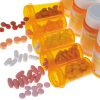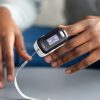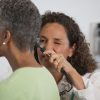- Empty cart.
- Continue Shopping
The Role of Emergency Contacts in Medication Safety

When it comes to managing your health, medication safety is paramount. Many individuals rely on prescription and over-the-counter medications to treat various medical conditions, and while these medications can be incredibly effective, they also come with potential risks and side effects. One crucial aspect of medication safety that is often overlooked is the importance of having designated emergency contacts.
Understanding Medication Safety
Before delving into the role of emergency contacts, it’s essential to understand the concept of medication safety. Medication safety encompasses a range of practices and precautions aimed at minimizing the risks associated with taking medications. These risks can include:
- Adverse reactions or side effects
- Medication errors, such as taking the wrong dose
- Drug interactions with other medications or substances
- Allergic reactions
- Overdose or accidental ingestion by children or pets
Ensuring medication safety is not only the responsibility of healthcare professionals but also of individuals taking medications and their support networks.
The Role of Emergency Contacts
Emergency contacts play a vital role in medication safety, serving as a safeguard in case of unexpected situations or emergencies related to your medications. Here’s why they are essential:
1. Immediate Assistance in Case of Adverse Reactions
While healthcare providers strive to prescribe medications that are safe and appropriate for your condition, there is always a possibility of unexpected adverse reactions. These reactions can range from mild symptoms like nausea or dizziness to severe allergic reactions. In such cases, having an emergency contact allows for immediate communication with someone who can help you seek medical attention or provide guidance on how to respond.
2. Assistance in Medication Administration
Some individuals, especially those with chronic illnesses or conditions that affect their cognitive abilities, may require assistance with medication administration. An emergency contact can step in to ensure that medications are taken correctly and according to the prescribed dosage.
3. Support During Medication Changes
Medication regimens can change over time as your healthcare needs evolve. When a healthcare provider modifies your medications, it can be helpful to have an emergency contact who is aware of these changes. This individual can assist in tracking the new medications, potential side effects, and any adjustments required.
4. Alerting Healthcare Providers
In situations where you are unable to communicate or make decisions about your health, such as during a medical emergency or if you become unconscious, your emergency contact can serve as a liaison with healthcare providers. They can provide critical information about your medical history, current medications, and any known allergies, which can influence treatment decisions.
5. Ensuring Medication Accessibility
In some cases, you may need your emergency contact to access your medications or medical records, especially if you are incapacitated or hospitalized. Having a designated individual who can retrieve essential medications can be crucial in maintaining your health.
Choosing and Communicating with Emergency Contacts
Selecting the right emergency contacts is a critical step in ensuring medication safety. Here are some guidelines to consider:
1. Choose Trusted Individuals
Your emergency contacts should be people you trust and who are familiar with your medical history and medications. This could be a close family member, friend, or caregiver who can act responsibly in emergency situations.
2. Keep Them Informed
It’s essential to keep your emergency contacts informed about your current health condition, medications, and any changes in your treatment plan. Regularly update them on any adjustments to your medications or dosages.
3. Provide Access to Information
Ensure that your emergency contacts have access to essential information, such as a list of your medications, dosages, and the contact information for your healthcare providers. You can keep this information in a readily accessible location, such as a wallet card or a smartphone app.
4. Discuss Your Wishes
Have a conversation with your emergency contacts about your healthcare preferences in different situations. This can include discussing your preferences for life-saving measures, such as resuscitation, and any advanced directives you may have.
In Conclusion, Medication safety is a fundamental aspect of managing your health, and having designated emergency contacts is a crucial component of this safety net. These individuals serve as a lifeline in case of unexpected situations, adverse reactions, or emergencies related to your medications. By choosing trusted individuals, keeping them informed, and providing access to essential information, you can enhance your medication safety and ensure that you receive the necessary support when you need it most. Remember that medication safety is a collaborative effort between healthcare professionals, patients, and their support networks, and having reliable emergency contacts is a step toward achieving that goal.








